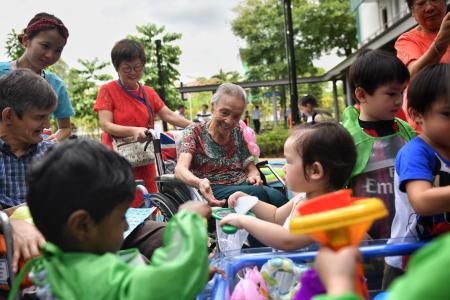Nursing home: Ageing well with help from kids
A bubbly child makes most elderly people smile but opportunities to interact with the young are not always easy to come by.
Multi-generational households are becoming less common here.
Such regular inter-generational bonding is important for the elderly's well-being, and more should be done to promote such opportunities, said sociologists, geriatric experts and MPs.
The call comes on the heels of St Joseph's Home's launching of an inter-generational playground, infant and childcare centre this week on the premises of the nursing home.
The Government also plans to co-locate childcare and eldercare facilities in new housing developments, with the first at Kampung Admiralty in Woodlands.
Such initiatives will help the elderly stave off problems such as social isolation.
Associate Professor Philip Yap, director of the geriatric centre at Khoo Teck Puat Hospital, pointed out that overseas studies show that seniors who mixed with young children showed improvements in brain and physical functions.
Research also showed the elderly helped the children "improve their behaviour and literacy skills", he added.
This can be observed at St Joseph's childcare service.
Children and nursing home residents are allowed to interact under supervision.
Its principal Frances Yap said: "Such mixing helps the children in their social development. They develop empathy and learn to help others, such as when they aid the elderly in performing tasks because their hands can be weak."
Mr Don Tan, centre manager and senior social worker at Tsao Foundation's Hua Mei Elder-centred Programme of Integrated Comprehensive Care, said: "Elders are generally more happy when there are kids around - the latter's spontaneity and energy is almost infectious. As three-generational homes have become less common over the years and more older people live by themselves, inter-generational common spaces become more important."
MPs in areas with a high proportion of older residents are on board with creating more of such spaces.
MacPherson MP Tin Pei Ling said that something as simple as building a children's playground and senior citizens' fitness corner next to each other can be effective.
Associate Professor of sociology at the National University of Singapore Daniel Goh said: "Some countries like Japan and the US have started this too.
"It is not just co-location of facilities, but programmes that bring the two generations together in their everyday life."
NUS sociologist Tan Ern Ser said he is studying how inter-generational mixing could "contribute to ageing-in-place and prevent the marginalisation of seniors, keeping them engaged with their respective communities for all ages".
"The opportunity to bond, care, and share their skills and stories may give meaning and a sense of purpose to their lives."
Get The New Paper on your phone with the free TNP app. Download from the Apple App Store or Google Play Store now



